
Michael Lerner
@michaelhlerner.bsky.social
Assistant Professor of Public Policy & Administration at LSE Government. Studying politics in a changing environment. https://www.michael-lerner.com
So, when a company's directors care about the environment, it tends to adopt pro-climate policies. At a moment when companies are walking away from their climate commitments, our paper shows the benefits of empowering corporate leaders who value and support climate action 4/4
May 1, 2025 at 7:37 PM
So, when a company's directors care about the environment, it tends to adopt pro-climate policies. At a moment when companies are walking away from their climate commitments, our paper shows the benefits of empowering corporate leaders who value and support climate action 4/4
And does having green directors on the board matter? Yes!
Firms with more green directors are more likely to:
- report GHG emissions voluntarily
- appoint a chief sustainability officer
- join pro-climate political coalitions
- announce a Net Zero commitment (ambitious ones!)
3/4
Firms with more green directors are more likely to:
- report GHG emissions voluntarily
- appoint a chief sustainability officer
- join pro-climate political coalitions
- announce a Net Zero commitment (ambitious ones!)
3/4
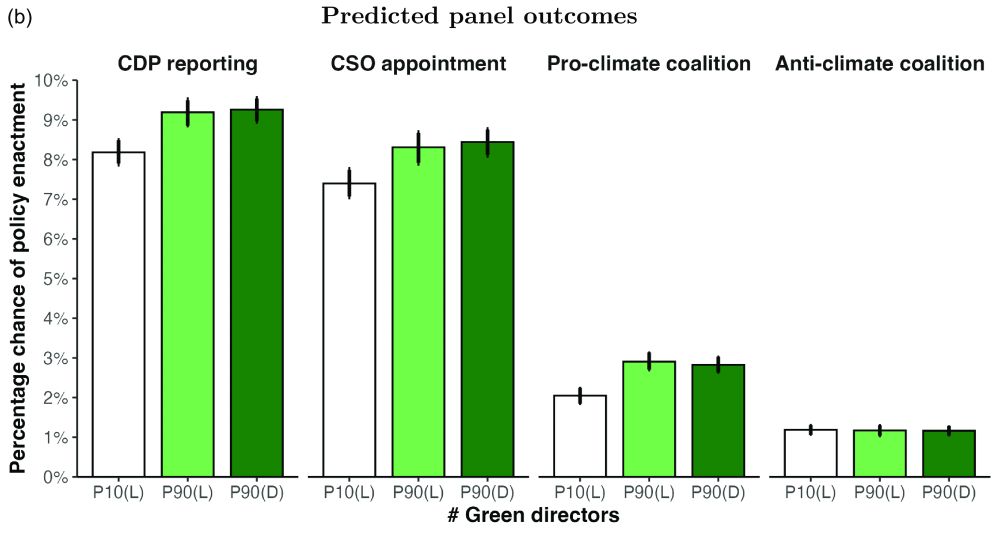
May 1, 2025 at 7:37 PM
And does having green directors on the board matter? Yes!
Firms with more green directors are more likely to:
- report GHG emissions voluntarily
- appoint a chief sustainability officer
- join pro-climate political coalitions
- announce a Net Zero commitment (ambitious ones!)
3/4
Firms with more green directors are more likely to:
- report GHG emissions voluntarily
- appoint a chief sustainability officer
- join pro-climate political coalitions
- announce a Net Zero commitment (ambitious ones!)
3/4
It might not feel like it right now, but pro-environmental attitudes are more common among Corporate America’s leaders than ever. Today, about 1 in 4 directors at the average firm give primarily (or solely) to political candidates endorsed by green PACs – twice as many as in the 1990s 2/4
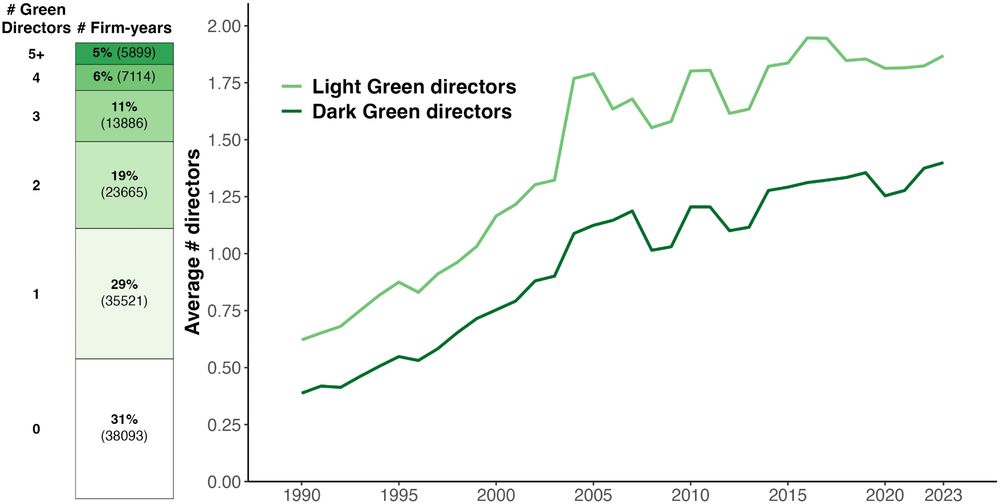
May 1, 2025 at 7:37 PM
It might not feel like it right now, but pro-environmental attitudes are more common among Corporate America’s leaders than ever. Today, about 1 in 4 directors at the average firm give primarily (or solely) to political candidates endorsed by green PACs – twice as many as in the 1990s 2/4
Many many thanks to my wonderful team of co-authors, including @fgenovese.bsky.social and @gard-murray.bsky.social, as well as the carbon pricing experts who generously participated in the study!
7/7
7/7
December 17, 2024 at 7:22 PM
Many many thanks to my wonderful team of co-authors, including @fgenovese.bsky.social and @gard-murray.bsky.social, as well as the carbon pricing experts who generously participated in the study!
7/7
7/7
To sum up:
1) Some aspects of carbon pricing seem to have conflicting implications for technical effectiveness vs political feasibility
2) Feasibility concerns sometimes trump effectiveness, suggesting experts are attuned to the political risks of carbon pricing in developing countries
6/7
1) Some aspects of carbon pricing seem to have conflicting implications for technical effectiveness vs political feasibility
2) Feasibility concerns sometimes trump effectiveness, suggesting experts are attuned to the political risks of carbon pricing in developing countries
6/7
December 17, 2024 at 7:22 PM
To sum up:
1) Some aspects of carbon pricing seem to have conflicting implications for technical effectiveness vs political feasibility
2) Feasibility concerns sometimes trump effectiveness, suggesting experts are attuned to the political risks of carbon pricing in developing countries
6/7
1) Some aspects of carbon pricing seem to have conflicting implications for technical effectiveness vs political feasibility
2) Feasibility concerns sometimes trump effectiveness, suggesting experts are attuned to the political risks of carbon pricing in developing countries
6/7
_Preferences_
When asked which policy they would propose to a policymaker, the experts preferred
• Emissions trading over a tax (no trade-off required)
• Broad coverage over narrow
• Revenue use for green infrastructure or vulnerable populations – but definitely not for the general public
5/7
When asked which policy they would propose to a policymaker, the experts preferred
• Emissions trading over a tax (no trade-off required)
• Broad coverage over narrow
• Revenue use for green infrastructure or vulnerable populations – but definitely not for the general public
5/7
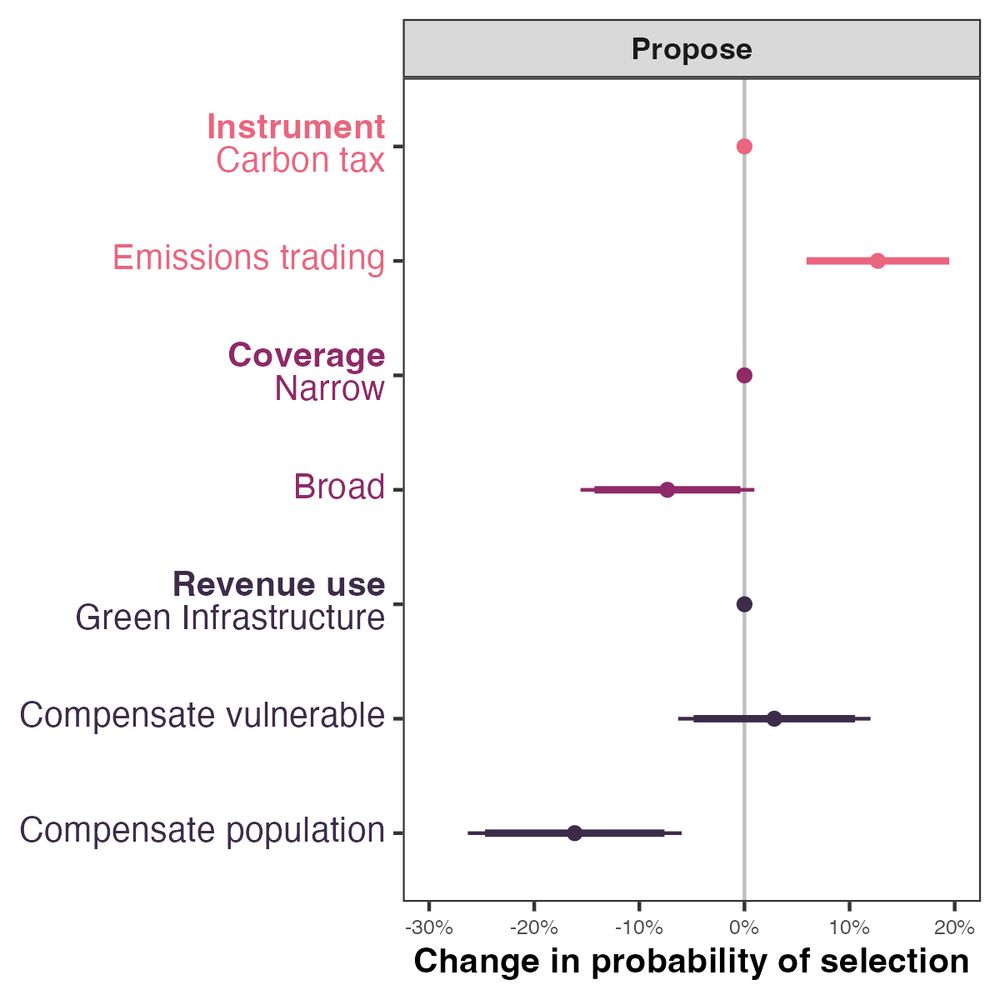
December 17, 2024 at 7:22 PM
_Preferences_
When asked which policy they would propose to a policymaker, the experts preferred
• Emissions trading over a tax (no trade-off required)
• Broad coverage over narrow
• Revenue use for green infrastructure or vulnerable populations – but definitely not for the general public
5/7
When asked which policy they would propose to a policymaker, the experts preferred
• Emissions trading over a tax (no trade-off required)
• Broad coverage over narrow
• Revenue use for green infrastructure or vulnerable populations – but definitely not for the general public
5/7
_Perceptions_
Experts say emissions trading is similarly effective and more politically feasible than a carbon tax
A broad policy seems similarly effective as a narrowly targeted one, but far less feasible
Spending funds on compensation is seen as less effective but more politically feasible
4/7
Experts say emissions trading is similarly effective and more politically feasible than a carbon tax
A broad policy seems similarly effective as a narrowly targeted one, but far less feasible
Spending funds on compensation is seen as less effective but more politically feasible
4/7
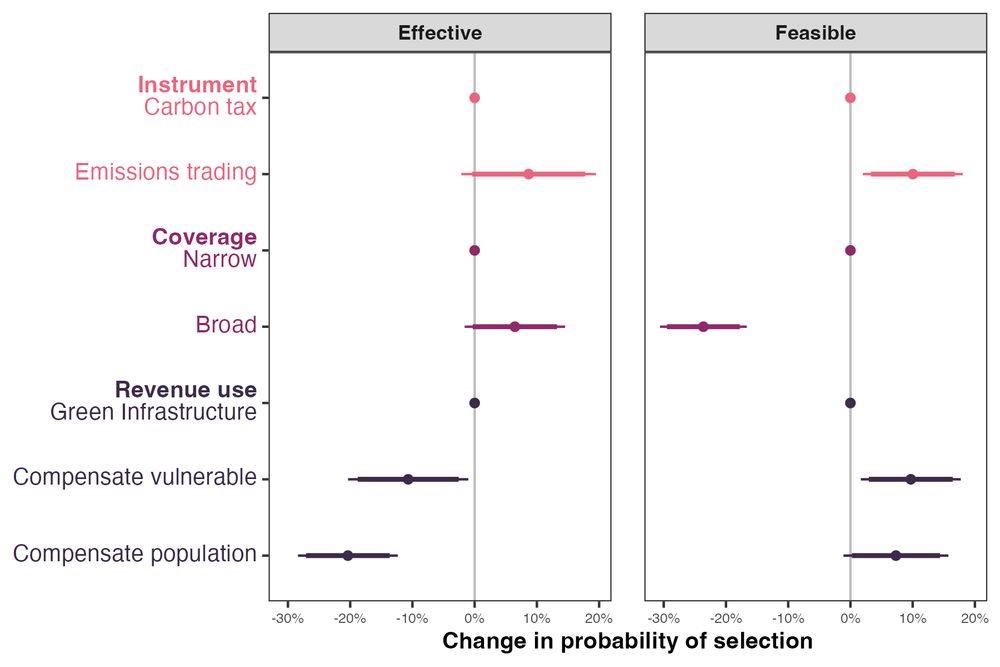
December 17, 2024 at 7:22 PM
_Perceptions_
Experts say emissions trading is similarly effective and more politically feasible than a carbon tax
A broad policy seems similarly effective as a narrowly targeted one, but far less feasible
Spending funds on compensation is seen as less effective but more politically feasible
4/7
Experts say emissions trading is similarly effective and more politically feasible than a carbon tax
A broad policy seems similarly effective as a narrowly targeted one, but far less feasible
Spending funds on compensation is seen as less effective but more politically feasible
4/7
As part of a larger survey (hdl.handle.net/10986/42093), we asked experts to choose between alternative designs for a carbon pricing policy in Carbonia, a fictional developing country with relatively strong government capacity, high inequality, and substantial oil and gas production.
3/7
3/7
![In the context of Carbonia, consider the following designs: [table with two policies and designs for instrument, coverage, and revenue use]. Which would be more technically effective (reducing emissions)? Which would be more politically feasible (easily adopted)? Which would you propose to the policymaker?](https://cdn.bsky.app/img/feed_thumbnail/plain/did:plc:5wyjqwfaotagdzr6xz7bjrqk/bafkreicqz3lxursech56lrj5mnm3acg2rakezlmoo7q33bwbpwhnmxljeq@jpeg)
December 17, 2024 at 7:22 PM
As part of a larger survey (hdl.handle.net/10986/42093), we asked experts to choose between alternative designs for a carbon pricing policy in Carbonia, a fictional developing country with relatively strong government capacity, high inequality, and substantial oil and gas production.
3/7
3/7
Carbon pricing isn't just for wealthy countries! The policy has already been adopted by 16 developing countries (dark green) & is under consideration in more than a dozen others (light green)
Why do Global South policymakers prefer some carbon pricing policies over others? We investigated 🔎
2/7
Why do Global South policymakers prefer some carbon pricing policies over others? We investigated 🔎
2/7
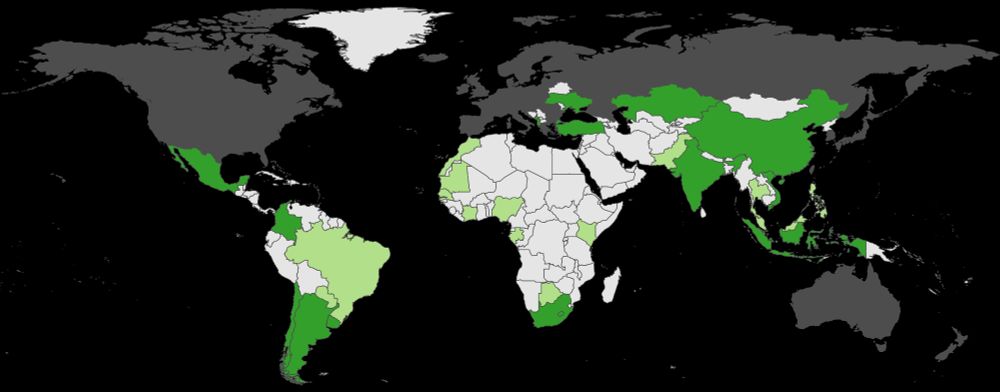
December 17, 2024 at 7:22 PM
Carbon pricing isn't just for wealthy countries! The policy has already been adopted by 16 developing countries (dark green) & is under consideration in more than a dozen others (light green)
Why do Global South policymakers prefer some carbon pricing policies over others? We investigated 🔎
2/7
Why do Global South policymakers prefer some carbon pricing policies over others? We investigated 🔎
2/7
I’m proud to have led this project team in collaboration with @gard-murray.bsky.social and @fgenovese.bsky.social, as well other researchers from LSE Consulting and adelphi Consult!
September 16, 2024 at 11:59 AM
I’m proud to have led this project team in collaboration with @gard-murray.bsky.social and @fgenovese.bsky.social, as well other researchers from LSE Consulting and adelphi Consult!

